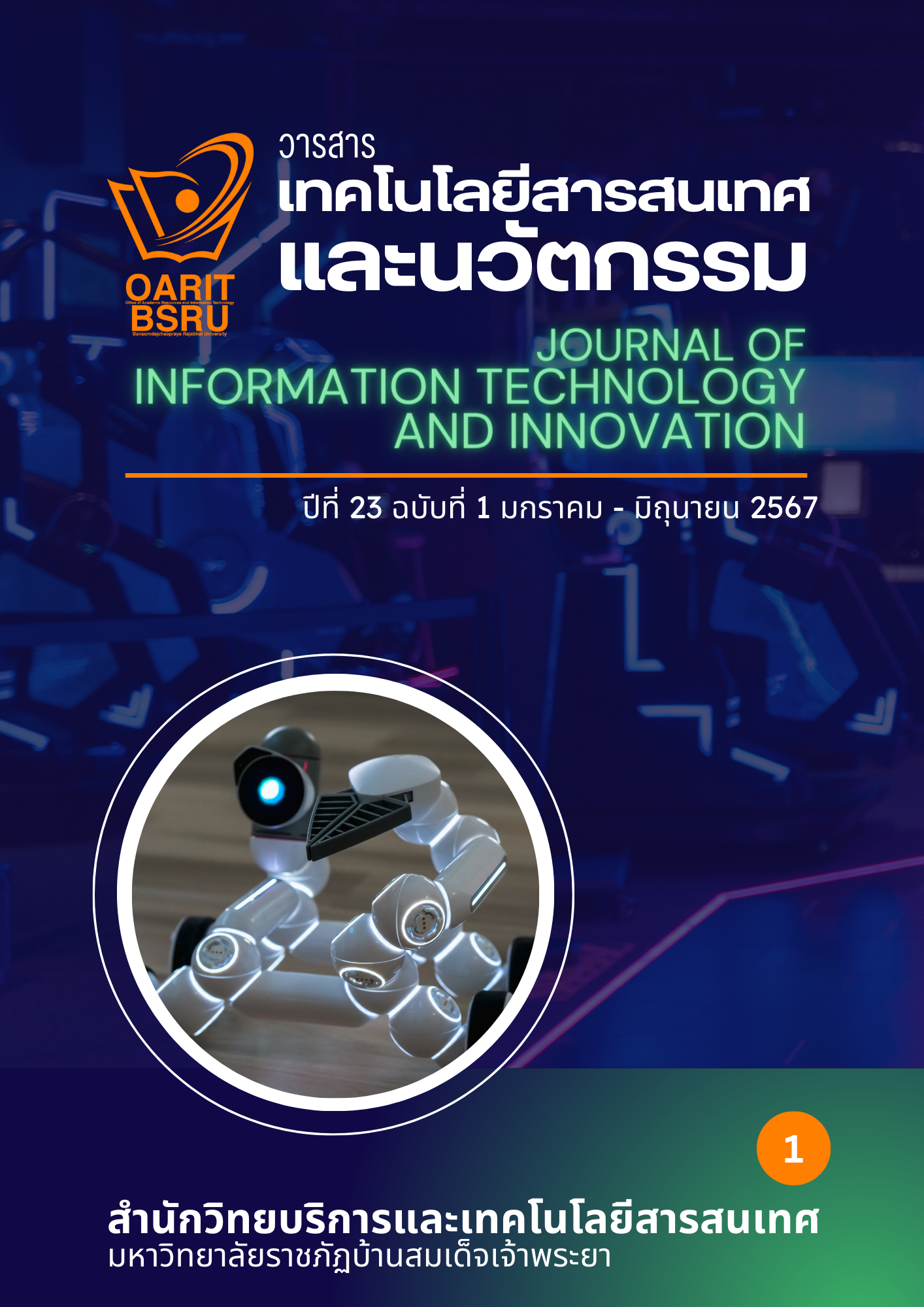ปัญญาประดิษฐ์แบบรู้สร้างในการศึกษา : ChatGPT และ Gemini ในบทบาทของ เครื่องมือทางการศึกษา
คำสำคัญ:
ปัญญาประดิษฐ์แบบรู้สร้างในการศึกษา, แชตจีพีที, เจมิไนบทคัดย่อ
ในระยะเวลา 1 – 2 ปีนี้ได้เกิดการเปลี่ยนแปลงครั้งสำคัญในแวดวงของศาสตร์ด้านปัญญาประดิษฐ์ นั่นคือ การเกิดขึ้นของสิ่งที่เรียกว่า ปัญญาประดิษฐ์แบบรู้สร้าง โดยลักษณะสำคัญของปัญญาประดิษฐ์ชนิดนี้ คือ ความสามารถในการสร้างเนื้อหาต่าง ๆ ได้โดยอัตโนมัติทั้งข้อความ ภาพ เสียง ภาพเคลื่อนไหว และความสามารถในการโต้ตอบที่คล้ายมนุษย์ ทำให้เกิดการนำปัญญาประดิษฐ์ชนิดนี้ไปใช้ในการทำงานด้านต่าง ๆ อย่างหลากหลาย ทั้งงานด้านการวิเคราะห์ข้อมูล งานด้านคอมพิวเตอร์ งานด้านการออกแบบสื่อ งานเพลง รวมถึงงานด้านการศึกษาในสาขาวิชาต่าง ๆ ซึ่งมีหลักฐานเป็นงานวิจัยที่แสดงให้เห็นถึงการประยุกต์ใช้ปัญญาประดิษฐ์แบบรู้สร้างในลักษณะต่าง ๆ ถึงแม้ว่าปัญญาประดิษฐ์แบบรู้สร้างจะถูกนำไปใช้ประโยชน์ได้อย่างหลากหลายโดยเฉพาะในงานด้านการศึกษา แต่ยังปรากฏข้อจำกัดในการใช้หลายประการ บทความนี้เขียนขึ้นโดยมีวัตถุประสงค์เพื่ออธิบายเกี่ยวกับปัญญาประดิษฐ์แบบรู้สร้างโดยได้มีการยกตัวอย่างปัญญาประดิษฐ์แบบรู้สร้างที่กำลังเป็นที่นิยมใช้อย่าง ChatGPT และ Gemini ประกอบ ประโยชน์ของปัญญาประดิษฐ์แบบรู้สร้างในการศึกษา ข้อจำกัดของการใช้งานปัญญาประดิษฐ์แบบรู้สร้างในการศึกษา และการนำปัญญาประดิษฐ์แบบรู้สร้างไปใช้ในทางปฏิบัติ บทความนี้ช่วยทำให้เกิดความกระจ่างชัดเกี่ยวกับความนิยมที่เพิ่มขึ้นของปัญญาประดิษฐ์แบบรู้สร้างและการใช้ประโยชน์ที่เป็นไปได้โดยตระหนักถึงข้อจำกัดบางประการที่ต้องพิจารณาเมื่อนำไปใช้ในโลกจริง
เอกสารอ้างอิง
Abukmeil, M., Ferrari, S., Genovese, A., Piuri, V., & Scotti, F. (2021). A survey of unsupervised
generative models for exploratory data analysis and representation learning.
ACM Computing Surveys. 54(5), 1-40. https://doi.org/10.1145/3450963
Alafnan, M. A., Dishari, S., Jovic, M., & Lomidze, K. (2023). ChatGPT as an educational tool:
Opportunities, challenges, and recommendations for communication, business writing,
and composition courses. Journal of Artificial Intelligence and Technology. 3(2),
–68. https://doi.org/10.37965/jait.2023.0184
Alshater, M. M. (2022). Exploring the Role of Artificial Intelligence in Enhancing Academic
Performance: A Case Study of ChatGPT. SSRN. http://dx.doi.org/10.2139/ssrn.4312358
Atlas, S. (2023). ChatGPT for Higher education and professional development: A guide to
conversational AI. Digital Commons@URI. https://digitalcommons.uri.edu/cba_
facpubs/548/
Aydın, Ö., & Karaarslan, E. (2022). OpenAI ChatGPT Generated Literature Review: Digital Twin in
Healthcare . In Ö. Aydın (Ed.), Emerging Computer Technologies. 2, 22-31. İzmir Akademi
Dernegi. http://dx.doi.org/10.2139/ssrn.4308687
Baidoo-Anu, D., Owusu Ansah, L. (2023). Education in the era of generative artificial intelligence
(AI): Understanding the potential benefits of ChatGPT in promoting teaching and learning. Journal of AI. 7(1),52-62.
Chinonso, O. E., Theresa, A. M-E., & Aduke, T. C. (2023). ChatGPT for teaching, learning and
research: Prospects and challenges. Global Academic Journal of Humanities and Social Sciences. 5(2), 33-40. doi:
36348/gajhss.2023.v05i02.001
D'Mello, S., Craig, S., Witherspoon, A., & Graesser, A. (2014). Affective and learning-related dynamics during interactions with an
intelligent tutoring system. International Journal of Human-Computer Studies. 72(6), 415-435.
Elsen-Rooney, M. (2023). NYC education department blocks ChatGPT on school devices, networks. Chalkbeat New York. schools-ban-
chatgpt-writing-artificial- intelligence
Gemini (language model). (2024, June 19). In Wikipedia. https://en.wikipedia.org/wiki/
Gemini_(language_model).
Gemini Team, Google. (2024). Gemini: A family of highly capable multimodal models. Google
Deepmind. https://storage.googleapis.com/deepmindmedia/gemini/gemini_
v1_5_report.pdf
Gemini. (2024). Gemini (Mar 11 version) [Large language model]. https://gemini.google.com/u/1/app
Gui, J., Sun, Z., Wen, Y., Tao, D., & Ye, J. (2021). A review on generative adversarial networks: Algorithms, theory, and applications. IEEE
Transactions on Knowledge and Data Engineering. 35(4), 3313-3332. doi: 10.1109/TKDE.2021.3130191
Herft, A. (2023). A Teacher's Prompt Guide to ChatGPT aligned with 'What Works Best' Guide.
UserGenerated Education. https://usergeneratededucation.files.wordpress.com/2023/
/a-teachers-prompt-guide-to-chatgpt-aligned-with-what-works-best.pdf
Hu, L. (2022). Generative AI and future. Medium. https://pub.towardsai.net/generative-ai-and-
future-c3b1695876f2
Jovanović, M. & Campbell, M. (2022). Generative artificial intelligence: Trends and prospects.
Computer. 55(10), 107 – 112. doi: 10.1109/MC.2022.3192720
Kohnke, L., Moorhouse, B.L., & Zou, D. (2023). ChatGPT for language teaching and Learning.
RELC Journal. 54(2), 537–550. https://doi.org/10.1177/00336882231162868
Lee, G-G., Shi, L., Latif, E., & Zhai, X. (2023). Gemini Pro Defeated by GPT-4V: Evidence from
Education. Coenell University. https://arxiv.org/abs/2401.08660
Lo, C.K. (2023). What Is the impact of ChatGPT on education? a rapid review of the literature. Education Sciences. 13(4), 410.
http://dx.doi.org/10.3390/educsci13040410
Mhlanga, D. (2023). Open AI in Education, the Responsible and Ethical Use of ChatGPT Towards Lifelong Learning. SSRN.
http://dx.doi.org/10.2139/ssrn.4354422
OpenAI. (2024). ChatGPT (Mar 11 version) [Large language model]. https://chat.openai.com/chat.
Pavlik, J. V. (2023). Collaborating with ChatGPT: Considering the implications of generative artificial intelligence for journalism and
media education. Journalism & Mass Communication Educator. 78(1), 84–93. https://doi.org/10.1177/10776958221149577
Rane, N., Choudhary, S. & Rane, J. (2024). Gemini versus ChatGPT: Applications, performance,
architecture, capabilities, and implementation. SSRN. http://dx.doi.org/10.2139/ssrn.4723687
Sallam, M. (2023). ChatGPT utility in healthcare education, research, and practice: Systematic
review on the promising perspectives and valid concerns. Healthcare. 11(6), 887. https://doi.org/10.3390/healthcare11060887
Sallam, M., Salim, N.A., Barakat, M., & Al-Tammemi, Ala’a B. (2023). ChatGPT applications in medical, dental, pharmacy, and public health
education: A descriptive study highlighting the advantages and limitations. Narra J. 3(1). https://doi.org/10.52225/
narra.v3i1.103
Terwiesch, C. (2023). Would Chat GPT3 get a Wharton MBA? a prediction based on its performance in the operations management
course. The Mack Institute for Innovation
Management.https://mackinstitute.wharton.upenn.edu/wp-content/uploads/2023/01/Christian-Terwiesch-Chat-GTP.pdf
Tlili, A., Shehata, B., Adarkwah, M. A., Bozkurt, A., Hickey, D. T., Huang, R., & Agyemang, B. (2023). What if the devil is my guardian angel:
ChatGPT as a case study of using chatbots in education. Smart Learning Environment. 10(15). https://doi.org/10.1186/s40561-
-00237-x
ดาวน์โหลด
เผยแพร่แล้ว
รูปแบบการอ้างอิง
ฉบับ
ประเภทบทความ
สัญญาอนุญาต
ลิขสิทธิ์ (c) 2024 วารสารเทคโนโลยีสารสนเทศและนวัตกรรม

อนุญาตภายใต้เงื่อนไข Creative Commons Attribution-NonCommercial-NoDerivatives 4.0 International License.
บทความ ข้อความ ภาพประกอบ และตารางประกอบที่ลงพิมพ์ในวารสารเป็นความคิดเห็นส่วนตัวของผู้นิพนธ์ กองบรรณาธิการไม่จำเป็นต้องเห็นตามเสมอไป และไม่มีส่วนรับผิดชอบใดๆ ถือเป็นความรับผิดชอบของผู้นิพนธ์เพียงผู้เดียว






